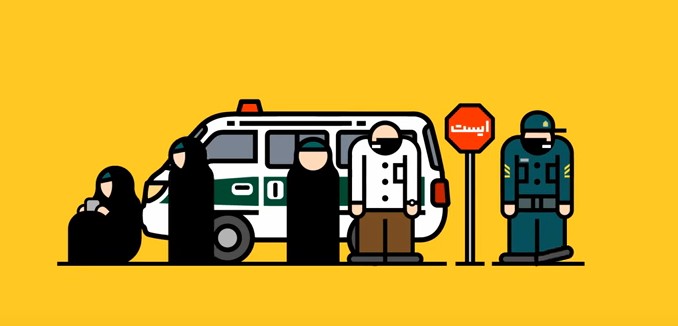Gershad, an Iranian crowdsourcing app designed to allow users to avoid the morality police, known as the Ershad, became a massive success almost immediately after its launch, only to be blocked by regime authorities less than a day later.
The app allows users to mark where they saw an Ershad patrol on a map of Tehran. If enough users identified a location, it would show up on a map so that anyone who feared a possibly arbitrary arrest could avoid the area, similar to the Israeli-developed traffic app Waze. The app’s developers told the International Campaign for Human Rights in Iran that government officials, possibly detecting the high rate of downloads, had stepped in to block its distribution.
An Iranian police spokesman said that in the Persian year ending in March 2014, nearly three million warnings were issued by the Ershad, resulting in over 18,000 prosecutions. The morality police are especially capricious towards women: Haaretz reported that more than 40,000 cars have been confiscated in Iran because their drivers violated the law on wearing a hijab. Women wearing too much makeup or even walking with a man have been stopped, detained, and sometimes prosecuted.
“Why do we have to be humiliated for our most obvious right which is the right to wear what we want?” the app developers wrote on their web page, according to a BBC translation.
Social media networks and websites are full of footage and photos of innocent women who have been beaten up and dragged on the ground by the Ershad patrol agents. Police need to provide security for the citizens not to turn into a factor for fear. A while ago, angry with such unreasonable oppressions, we looked for a solution to find a practical way to resist the volume of injustices peacefully with low risk level, to restore part of our freedom.
“This is a good and interesting idea,” wrote a commenter on the app’s page. “I just hope that the security level is also high so that no one can track down the person who reported the location of Ershad.”
A video showing how the app would help Iranian avoid the Ershad is embedded below.
Iran imposes strict limits on women’s participation in society. Last October, two Iranian poets were sentenced to 99 lashes apiece and jail time for shaking hands with members of the opposite sex. A British-Iranian dual citizen was jailed in 2014 for trying to watch a men’s volleyball match. And after a cleric said last year that allowing women to attend a volleyball match would “promote prostitution,” Iran barred women from attending a game between the national teams of Iran and the United States.
In 2014, Iranian actress Leila Hatami was forced to apologize after being threatened with lashes for kissing the president of the Cannes film festival on the cheek. And last November, actress Sadaf Taherian fled to Dubai after posting pictures of herself to Facebook and Instagram with her hair uncovered. Following her escape, Taherian said that she had been subjected to sexual harassment.
While Iranian authorities limit citizens’ access to the internet, a number of them maintain an active presence on social media. When asked by a human rights activist in 2013 about how he maintained both Twitter and Facebook accounts while Iranians were barred from participating on those platforms, Foreign Minister Mohammad Javad Zarif laughed and said, “That’s life.”
[Photo: admin shad / YouTube ]




